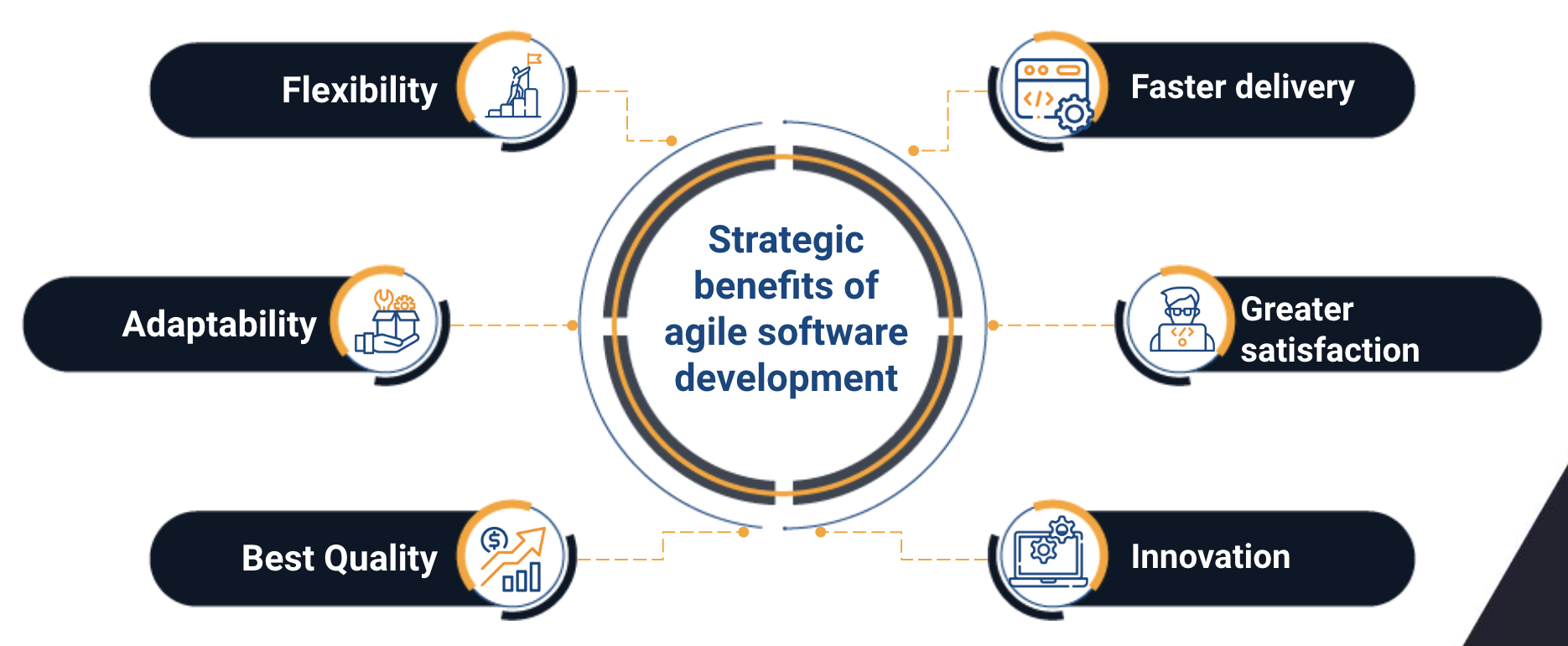
If you ask a CEO what aspect he wants to improve in his company's processes, he would probably answer: The speed of software development. And it makes perfect sense, as the business world today is driven by high customer demand and the speed with which businesses can respond to those needs.
In this scenario, agile software development becomes increasingly relevant and necessary, since it gives software development teams the ability to adapt to constant changes in the market and business environment. Agile software development allows companies to bring products to market faster and with higher quality, giving them a significant advantage.
Additionally, the focus on continuous collaboration with customers ensures that final products meet their needs and expectations, increasing customer satisfaction and loyalty. CEOs recognize that adopting agile development not only improves the efficiency and effectiveness of software development, but also drives organizational agility as a whole, allowing them to address business challenges with greater confidence and responsiveness.

Basic fundamentals of agile software development
Agile development is about “feedback and change,” according to a special issue on agile methodologies in IEEE Computer, cited by scientists at the University of Norway, in their study titled Agile Software Development: An Introduction and Overview, published at Researchgate.
“They emphasize that software development is an empirical or non-linear process, where feedback loops are necessary to achieve a desirable and predictable result,” can be read in the document.
Likewise, agile software development seeks to eliminate as many “heavy tasks” as are commonly associated with traditional software development methodologies. The ultimate goal is to be able to respond quickly to changing environments and demands during the software development cycle.
“The benefits of agile software development include its ability to support teams in an evolving landscape while maintaining a focus on efficiently delivering business value. The collaborative culture facilitated by agile software development also improves efficiency throughout the organization as teams work together and understand their specific roles in the process”, they also noted on the TechTarget portal.
Values that guide agile software development
The Agile Manifesto for Software Development emerged as a unifying statement of a philosophy shared by frameworks such as Scrum, Extreme Programming, and Feature-Driven Development (FDD). This manifesto marked a significant shift away from the waterfall project management approaches that were predominant until then.
Agile software development is based on these 4 values, published in the Agile Manifesto:
- Individuals and interactions over processes and tools
This value highlights the importance of people and interpersonal relationships within an agile software development team. Recognizes that effective communication and collaboration are key to project success.
- Software running on extensive documentation
Delivering functional, quality software is prioritized over generating large amounts of detailed documentation. This doesn't mean that documentation is irrelevant, but functioning software is valued more as the primary measure of progress.

- Collaboration with the client on contract negotiation
It is essential to work closely with the client to understand and meet their constantly evolving needs during agile software development. Adaptability through continuous collaboration is preferred over negotiating rigid contracts.
- Respond to change over following a plan
Recognize that requirements and priorities can change over time, and that it is critical to project success to be flexible and adaptable in response to these changes. The ability to adapt is valued over strict adherence to a predetermined plan.
Strategic benefits of agile software development
This philosophy of agile software development is not only something that concerns software development teams, but also those who lead the teams and even the companies. “Now agile methodologies, which imply new values, principles, practices and benefits and are a radical alternative to command and control style management, are spreading to a wide range of industries and functions and even to senior management”, they noted about it in an article in the Harvard Business Review magazine.
“By moving people out of their functional silos and placing them into self-managing, customer-focused, cross-functional teams, the agile approach is not only accelerating profitable growth but is also helping to create a new generation of skilled general managers,” they added.
Flexibility and adaptability
The agile approach recognizes that requirements and priorities can change over time. Therefore, rather than following a rigid plan, agile teams are willing to adapt as new needs arise or new information is obtained.
“One of the main advantages of agile methodologies is their ability to adapt quickly to changing circumstances. In a rapidly evolving business landscape, the flexibility offered by agile software development allows your companies to adjust their strategies, priorities and product features in response to market changes and customer feedback", they commented in an article published on LinkedIn.

Better quality of the product created
During agile software development, in each iteration tests are carried out and feedback is given to the client, to ensure that the product has the expected quality and the client is satisfied with the results achieved.
“The product is tested periodically during the development process to ensure all features are added. Agile software development also allows you to fix any errors that may occur in the process without much trouble. Each software release depends on the previous sprint cycle. With each sprint, there is an improvement in the quality of the software. When it reaches the final cycle, it will be ready to meet high quality standards”, they noted in a specialized article on the CEO Hangout portal.
Faster product delivery
By breaking development into short, focused iterations, agile software development teams can deliver new functionality more quickly and regularly, accelerating time to market and increasing competitive advantage.
Greater customer satisfaction
By continuously involving the customer throughout the development process, you ensure that the final product meets their expectations and needs, leading to greater customer satisfaction and loyalty.

Aspects to take into account in agile software development
- There is a lower degree of predictability in agile software development, in terms of time use and resource use, due to the flexible and changing aspect of the project, they warned in an article from the University of Minnesota.
- The team must be willing and have more energy to communicate effectively and commit to the changes of each of the project iterations.
- It is a team effort, which must be fully aligned: If any member is less committed than the rest, it will affect the entire team and the project.
- Documentation may be less comprehensive.
- If the objectives of the project are not very clear, its course can be diverted.
Do you need an agile software development team for your next project? At Rootstack, we have +14 years of experience supporting companies in their digital transformation. Contact us.

